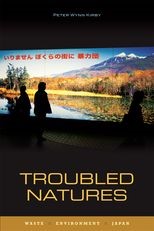Troubled Natures: Waste, Environment, Japan
Troubled Natures: Waste, Environment, Japan
Cite
Abstract
What does “environment” really mean in the complex, non-Western milieu of present-day Tokyo? How can anthropology contribute to the technical discussions and quantitative measures typically found in environmental studies? This book explores these questions through a deep cultural analysis of waste in contemporary Japan. The parameters are intentionally broad— encompassing ideas of “nature,” attitudes toward hygiene, notions of health and illness, problems with vermin and toxic waste, processes of social exclusion, and reproductive threats. The book concludes that how surroundings are conceived, invoked, and enacted is subjective, highly contextual, and under continual negotiation— with suggestive implications for anthropology, social science, and environmental studies generally. Focusing on two Tokyo neighborhoods, it shows how waste practices and ideas of pollution in the city tie clearly into broader social issues such as exclusionary practices, emergent lifestyle changes, recycling efforts, and novel forms of energy production. Throughout, waste and environmental health problems in Tokyo collide against diverse cultural elements linked to nature(s). The book's inquiry into the ways in which environmental questions circulate throughout Japanese society furnishes insight into central elements of contemporary Japanese life. As for the question of how to shape environmental policy internationally, the book reminds us that efforts to influence a society's waste shadow must unfold over a distinctive sociocultural topography where attitudes to garbage, health, purity, pollution, and excess can impact environmental priorities in profound ways.
-
Front Matter
-
1
Introduction: Japan’s Waste Shadow
-
2
Perils of Proximity: An Invisible Scourge
-
3
Mediated Anxieties: Nowhere to Hide
-
4
The Cult(ures) of Japanese Nature
-
5
Tokyo’s Vermin Menace
-
6
Pure Obsession: Pollution, Outcasts, and Exclusion
-
7
Growth, Sex, Fertility, and Decline
-
8
Constructing Sustainable Japan
- Conclusions
-
End Matter
Sign in
Personal account
- Sign in with email/username & password
- Get email alerts
- Save searches
- Purchase content
- Activate your purchase/trial code
Institutional access
-
Sign in through your institution
- Sign in with a library card Sign in with username/password Recommend to your librarian
Institutional account management
Sign in as administratorPurchase
Our books are available by subscription or purchase to libraries and institutions.
Purchasing information| Month: | Total Views: |
|---|---|
| May 2023 | 1 |
| September 2023 | 2 |
| December 2023 | 1 |
| December 2023 | 2 |
| December 2023 | 2 |



Get help with access
Institutional access
Access to content on Oxford Academic is often provided through institutional subscriptions and purchases. If you are a member of an institution with an active account, you may be able to access content in one of the following ways:
IP based access
Typically, access is provided across an institutional network to a range of IP addresses. This authentication occurs automatically, and it is not possible to sign out of an IP authenticated account.
Sign in through your institution
Choose this option to get remote access when outside your institution. Shibboleth/Open Athens technology is used to provide single sign-on between your institution’s website and Oxford Academic.
If your institution is not listed or you cannot sign in to your institution’s website, please contact your librarian or administrator.
Sign in with a library card
Enter your library card number to sign in. If you cannot sign in, please contact your librarian.
Society Members
Society member access to a journal is achieved in one of the following ways:
Sign in through society site
Many societies offer single sign-on between the society website and Oxford Academic. If you see ‘Sign in through society site’ in the sign in pane within a journal:
If you do not have a society account or have forgotten your username or password, please contact your society.
Sign in using a personal account
Some societies use Oxford Academic personal accounts to provide access to their members. See below.
Personal account
A personal account can be used to get email alerts, save searches, purchase content, and activate subscriptions.
Some societies use Oxford Academic personal accounts to provide access to their members.
Viewing your signed in accounts
Click the account icon in the top right to:
Signed in but can't access content
Oxford Academic is home to a wide variety of products. The institutional subscription may not cover the content that you are trying to access. If you believe you should have access to that content, please contact your librarian.
Institutional account management
For librarians and administrators, your personal account also provides access to institutional account management. Here you will find options to view and activate subscriptions, manage institutional settings and access options, access usage statistics, and more.